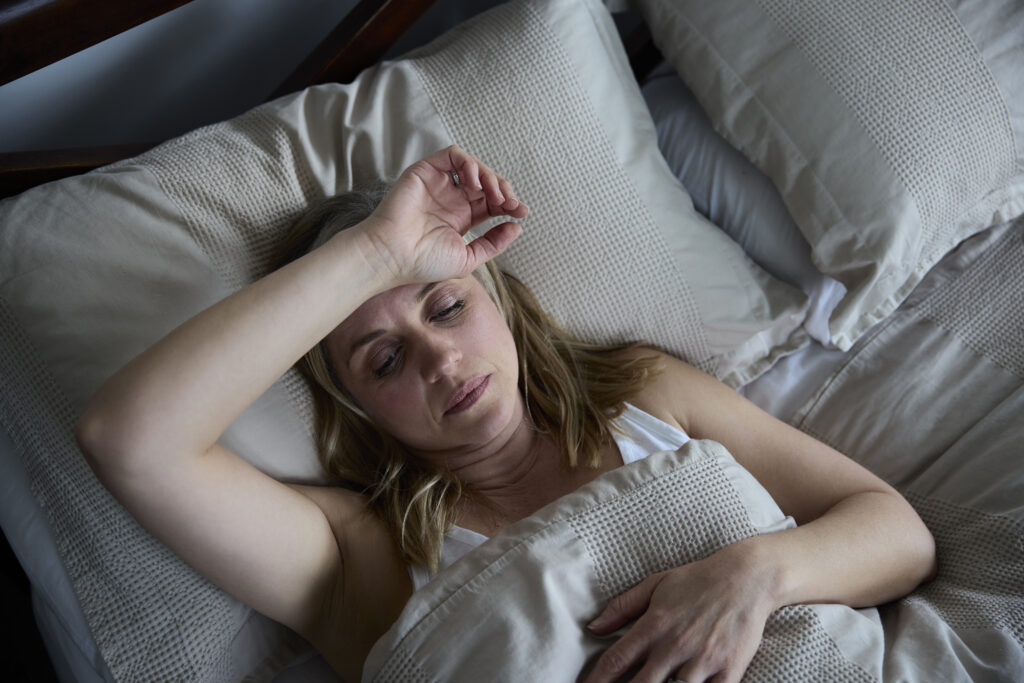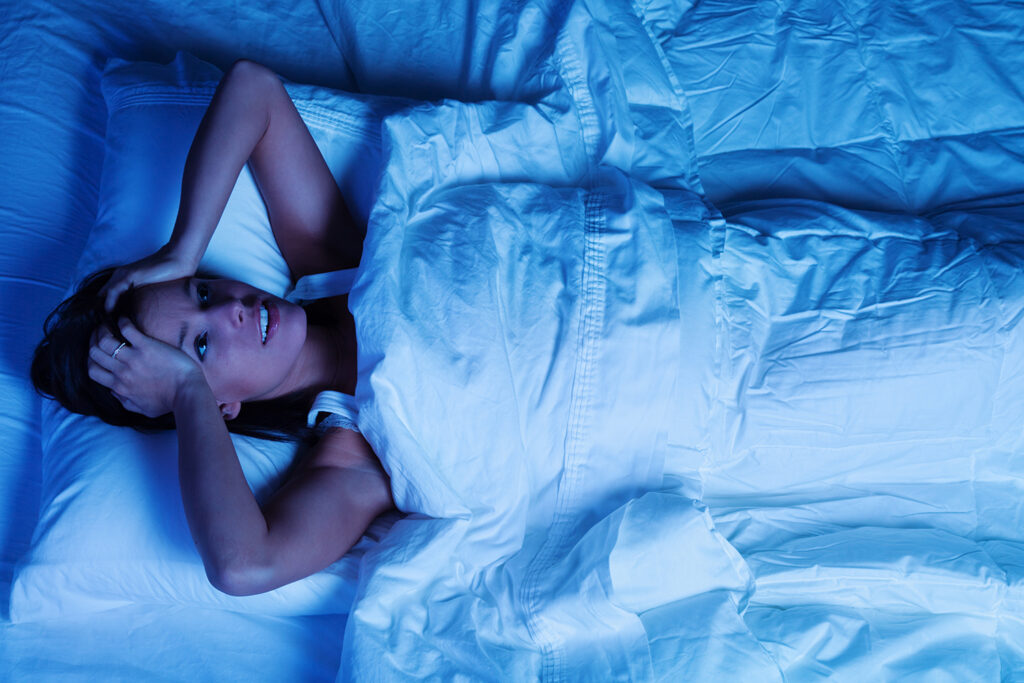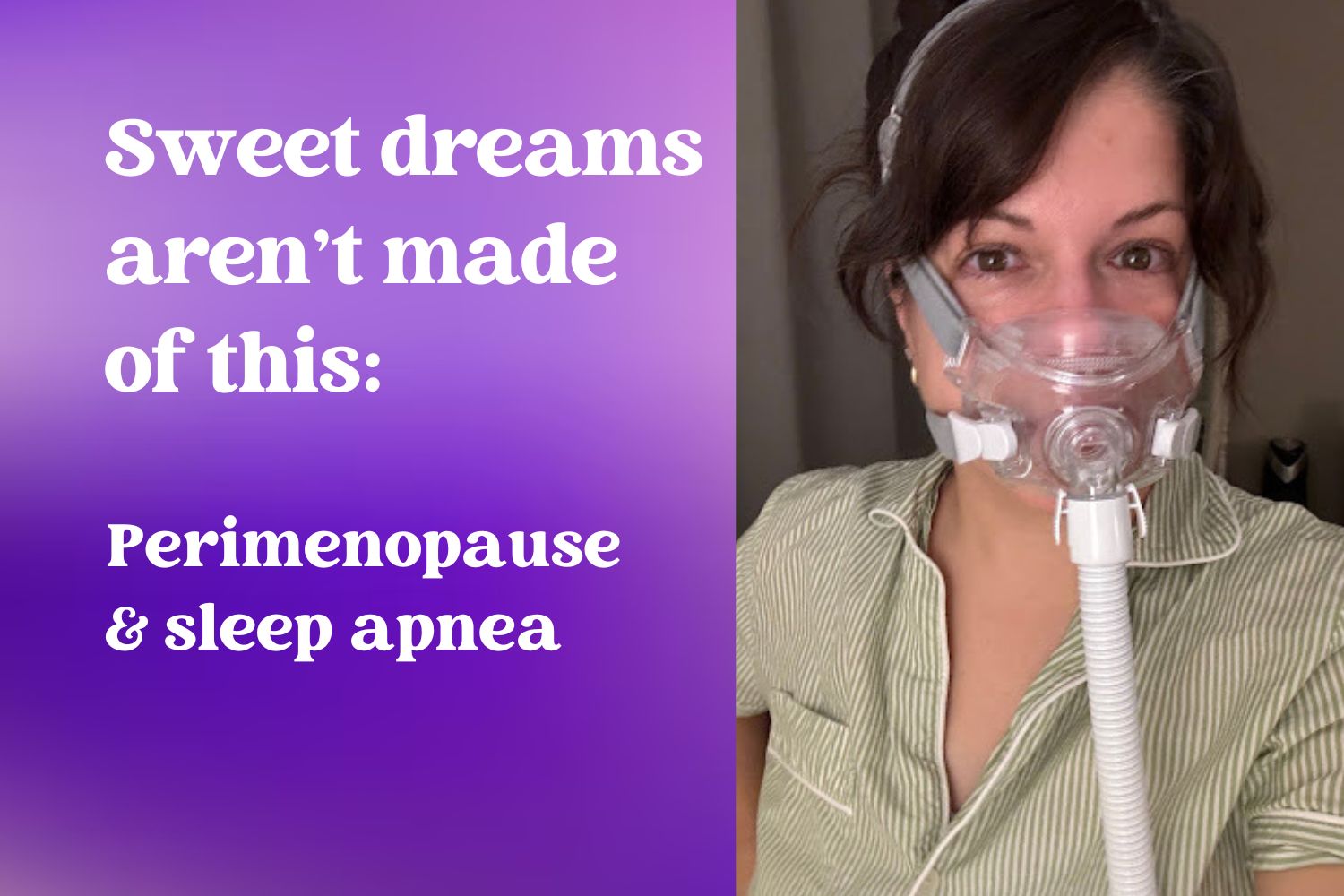
5 more tips for better sleep during menopause
Getting a good night’s sleep during midlife can be challenging, to say the least. If work and family worries aren’t enough to contend with, hormonal hot flashes, night sweats, anxiety, and insomnia often keep us awake. You loved the five tips we already threw down for better peri-/menopausal slumber. Good news: We’ve been digging in the research and came up with five more tips to get your best night’s sleep – even when the hot flashes are hitting hard.
Why is it hard to sleep during perimenopause and menopause?
There are several different factors at play during perimenopause and menopause that can affect sleep.
First up, falling levels of estrogen affect body temperature making us susceptible to night sweats and hot flashes. The internal thermometer in the brain is highly sensitive to fluctuating estrogen and can mistakenly think we’re overheating and need to cool down with sweating and flushing. Night sweats and flashes can be accompanied by a burst of adrenaline and maybe some heart palpitations too. Then once we’re awake it takes time to cool down, freshen up, and get back to sleep.
Secondly, estrogen interacts with melatonin, the main sleep hormone, in ways that are not yet fully understood. Scientists know that melatonin levels decrease with age, and for some women the symptoms that occur during menopause can amplify this change, leading to difficulties with falling asleep and staying asleep.
Finally, other symptoms associated with perimenopause and menopause like depression, anxiety, weight gain, and bladder problems can also interrupt sleep. And of course, worrying about sleep makes it even harder to get to sleep, so the whole process turns into a vicious cycle.

Should you nap during menopause?
There’s absolutely nothing wrong with catching a nap if it helps you get through the day. However, some people find napping makes them feel groggy and disoriented and less able to sleep well at night. To avoid this, try following the 30/90 sleep rule.
The rule suggests napping for either 30 minutes or 90 minutes – nothing in between. A 30-minute nap allows for light sleep but no deep sleep, while a 90-minute nap allows for a full sleep cycle (light sleep, deep sleep, then back to light sleep again). Both versions prevent you from waking during the deep sleep phase which can cause that familiar feeling of grogginess.
If your sleep has taken a nosedive in midlife, try these practical strategies to tackle the problem. (Taking Hormone Replacement Therapy? Not a problem, these tips are safe to try whether you’re taking HRT or not.)
Without further adieu, let’s get into it.

5 tips to prevent hormonal insomnia in women
1. Eat plenty of protein
Regulating your blood sugar levels during the day can make a huge difference to how well you sleep at night. If we ping-pong through the day on caffeine, sodas, and sugary snacks, our blood sugars go up and down like a rollercoaster triggering stress hormones which interfere with melatonin activity and getting to sleep.
Eating balanced meals that include plenty of good quality protein prevents the unnecessary release of stress hormones and keeps blood sugar levels more stable. This makes it easier to fall asleep and stay asleep at night.
Helpful protein choices include good-quality meat and fish, eggs, full-fat yogurt, beans, pulses, nuts, seeds, and tofu.
2. Stop eating 2 hours before bed or try a 12-hour overnight fast
Now you’ve got your balanced meals organized, aim to finish eating your last meal at least 2 hours before heading to bed. This gives your digestion plenty of time to process your meal so that you won’t be kept awake by acid reflux or indigestion. Want to take it a step further? Fasting is big news right now, and there are lots of different versions to try. One of the easiest versions, and one that can help with gut health, weight management, and blood sugar regulation – and therefore, sleep – is a 12-hour overnight fast. Simply wait 12 hours after finishing your evening meal before having breakfast – that’s it!

3. Drink tart cherry juice
Melatonin can be made in the body from an amino acid called tryptophan, found in lean poultry, red meat, tofu, salmon, milk, pumpkin seeds, and oatmeal. However, some foods contain ready-made melatonin. Including these foods at lunch and evening meals may give your body a helpful boost of sleep hormones.
Best foods with ready-made melatonin
– Strawberries
– Salmon
– Tart cherry juice
– Pistachio nuts
– Oatmeal
– Kidney beans
– Almonds
– Fennel
4. Stock your nightstand with rosewater spray, lavender oil, and Bach Flower Rescue Remedy
If hot flashes are keeping you awake, try this trio of remedies to cool and soothe. Spraying rosewater on your chest and the back of your neck can bring swift relief when a flash hits, while Rescue Remedy can help with any associated anxiety or panic. Lavender oil inhalation has been shown to reduce hot flash frequency in menopausal women, as well as being useful for relaxation and sleep.
5. Swap your duvet for layers of blankets
A duvet may be the ultimate in snuggly comfort but when it comes to temperature control, layers of blankets win hands down. Cotton or linen sheets and natural fiber blankets provide breathability and ease for keeping cool when a flash hits and for warming up again afterward.
There are many reasons why sleep becomes elusive in midlife, but these tips can help you get back on track for some restful, restorative shuteye.
Not sure whether you’re in perimenopause? Read What is perimenopause? Common symptoms, age, duration, and treatment options.



